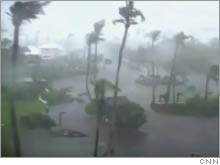 |
 |
| Hurricane Wilma as it batters Naples, FL, shortly after coming ashore early Monday. |
|
|
|
NEW YORK (CNN/Money) -
Hurricane Wilma pounded Florida's most developed region, stretching from Miami to West Palm Beach, which could turn it into one of the most costly storms in U.S. history.
AIR Worldwide, a firm that does catastrophe modeling for the insurance industry, estimated early Monday afternoon that insured losses from Wilma could come in between $6 billion and $9 billion. If that's correct, it would put losses behind only Hurricane Katrina earlier this year and Hurricane Andrew in 1992 in terms of insured losses. (For CNN.com's coverage of Hurricane Wilma, click here.)
"The largest driver of losses will be the concentration of properties on Florida's east coast between West Palm Beach and Miami," said a statement from Jayanta Guin, AIR's vice president of modeling. The firm estimates that there is more than $500 billion worth of insured properties in Miami-Dade and Broward counties alone.
"Based on Wilma's large size -- hurricane force winds extend about 90 miles from the center -- we expect to see widespread, though less severe, damage on Florida's east coast," said Guin's statement.
An earlier estimate from Eqecat Inc., another loss forecasting firm, estimated insured losses between $2 billion to $6 billion. That estimate was made before the storm made its way over to Florida's Atlantic coast. But its experts also acknowledged the risk of huge losses due to the amount of development in the storm's path.
"That area between Miami and Palm Beach is a huge cluster of insurance values and exposure," said Tom Larsen, senior vice president of Eqecat. "A very slight increase in the winds can cause significant increase in losses. Right now we're slightly below the design wind speed. But a little faster, you hit values where you see more things start to fail."
Even the higher estimates for Wilma's impact would be far below the record loss of up to $34 billion from Hurricane Katrina along the U.S. Gulf Coast in late August. But it would be more than the estimated losses from Hurricane Rita that hit the Texas-Louisiana border last month.
Other than Katrina, the only storms in which insurance claims have topped $7 billion were hurricanes Charley and Ivan in 2004, and Hurricane Andrew, which caused inflation adjusted losses of nearly $21 billion when it hit South Florida in 1992.
But Guin said the fact that South Florida has building codes that account for hurricanes should lessen the damage.
"The building code in south Florida is the most stringent in the U.S. and far more rigorous than in the parts of the Gulf Coast affected by Hurricanes Katrina and Rita," said Guin.
The Category 2 storm, with winds just above 100 mph, moved across the Florida peninsula Monday morning. Its center moved back over water when it moved over the Atlantic just off of West Palm Beach at about 11 a.m. ET, according to the National Hurricane Center.
The hurricane, which battered Mexico's Yucatan Peninsula over the weekend, hit the Florida mainland at about 6:30 a.m. ET Monday near Cape Romano, about 20 miles south of Naples, on Florida's Gulf Coast, according to the National Hurricane Center. The storm was classified as a strong Category 3 when it struck, with maximum sustained winds of 125 mph, it later was downgraded to a category 2 hurricane as it worked its way across the state.
Other catastrophe modeling firms said Monday it was too early to project insured losses from the storm, although Guin said the losses would almost certainly be "multiple billions."
"The fact that it is fast moving would limit things like damage from rain fall. But the fast movement contributes higher wind speeds and means it will be fairly strong when it crosses the state," said Kyle Beatty, a meteorologist for Risk Management Solutions, another loss estimate firm.
Wilma is the seventh hurricane to strike Florida in 14 months and a bit to the south of the path taken by Hurricane Charley in August 2004.
But oil prices were lower Monday since the oil platforms and refineries along the U.S. Gulf Coast hit recently by both hurricanes Katrina and Rita were spared the blow from the current storm.
For a look at the impact of hurricanes Katrina and Rita on insurer Allstate, click here.

|